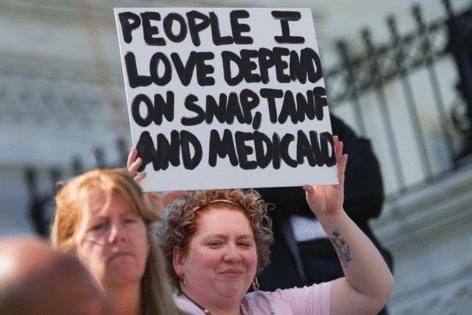Commentary: Medicaid is not a luxury, it's a lifeline
Published in Op Eds
Every time I chased stability to build a future, chronic illness pulled me back into a hospital bed.
Sometimes it has been for days, sometimes weeks. My life with sickle cell disease is a relentless cycle of excruciating pain, nerve damage and blood transfusions. I’ve survived two kidney transplants, countless medical procedures and numerous near-death experiences.
Decades of hospital stays and medical trauma have left me living with depression and complex post-traumatic stress disorder. The physical strain is constant, and the emotional toll — knowing that a single crisis can upend my life — is heavy.
It is true but of little comfort to know that I am not alone. Millions of Americans like me have debilitating medical conditions. Even when we are doing everything “right” — working, getting a college education, trying to build a stable future — we cannot keep pace with the demands of a system that expects disabled people to work like we aren’t sick and survive like we don’t need care. Every time I pushed myself past my limits to meet that expectation, I ended up in the hospital, paying with my body.
And so, like many others, I have relied on Medicaid, the government’s program that provides health coverage to low-income individuals and families. It is not a gravy train.
In New Jersey, where I live, the income cap for people receiving SSDI (Social Security Disability Insurance) and enrolled in Medicaid is about $1,550 a month. Income restrictions vary by state — I once spoke to someone in Arizona whose cap was just $500. These outdated limits force the disabled community into poverty by design. If we earn too much, we risk losing the medical care that keeps us alive. The safety net isn’t really a net — it’s a ceiling.
I am very grateful for the safety net we have. Many countries offer nothing to people like me. As a legal immigrant from Nigeria who came to the United States as a five-month-old baby, I would not be alive today without the help I have received from these programs. By protecting and strengthening this system, we honor the lives of those who depend on it.
But now, all of this is at risk. The Trump administration’s “One Big Beautiful Bill” will cut Medicaid by nearly $1 trillion over the next decade and includes new work requirements that will push millions off coverage. According to an analysis by the Kaiser Family Foundation, these changes could affect 10 to 12 million Americans, many of whom are already medically vulnerable.
And this means, quite frankly, that people like me will die.
“There’s really no questioning the basic reality that you can’t take health care away from 10 million people without causing many preventable deaths,” Dr. Adam Gaffney, a critical care physician and health policy researcher at Harvard Medical School, recently told the Associated Press. The projected impact is 7.6 million people stripped of coverage and more than 16,600 preventable deaths annually.
For me and millions of other Americans, losing Medicaid would mean losing access to anti-rejection medications after transplant. It would mean missing life-saving exchange transfusions that prevent strokes and organ damage. It would mean going without the medical care and medications that manage nerve pain and emotional stability.
Moreover, it will surely compound the trauma we already feel. Every time benefits are threatened or politicized, disabled people relive the fear that our care can be taken away. The system teaches us not to dream too big, not to earn too much, not to imagine a life beyond survival. How can people living with chronic illnesses or disabilities plan for stability — let alone home ownership or retirement — when every dollar earned is a risk to our lives?
Policymakers must confront this systemic failure. We need income caps raised or eliminated, work requirements rejected and Medicaid protections strengthened. Survival alone is not enough; we deserve the chance to thrive without fear that a job, a dream or a single extra paycheck will cost us our lives.
Cutting Medicaid and penalizing disabled workers is not fiscal responsibility — it’s moral failure. Our lives should not be budget line items. For me, and for millions like me, the stakes could not be clearer: Policy choices will determine whether or not we get to live.
_____
Idi Utuk is a Nigerian-born, American-made spiritual coach and graduate student in marriage and family therapy based in Willingboro, New Jersey. This column was produced for Progressive Perspectives, a project of The Progressive magazine, and distributed by Tribune News Service.
_____
©2025 Tribune Content Agency, LLC.
























































Comments